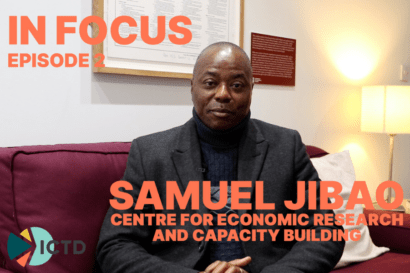The Call for Proposals for research projects on informality and taxation is currently closed. We aim to open a new call in late 2022. For any further questions, partnerships or collaborations, please get in touch with Vanessa van den Boogaard or Max Gallien.
Context
While international donors and policymakers have increasingly paid attention to the role of taxation in sustainable development, our understanding of taxation has largely been limited to thinking about formal taxes, sectors, and institutions. The ICTD’s research program on Informality, Tax, and the State seeks to support research on the relationship between informality and taxation.
Informal forms of revenue raising, informal institutions, and expanding attempts at taxing the so-called informal economy- albeit separate areas of study- are all critical to our understanding of how the majority of citizens engage with taxation and the state in low-income countries.
Furthermore, they have significant implications for equity, while being deeply intertwined with questions of power, accountability and governance.
We are seeking research proposals that explore these key ideas, focusing specifically on research on (1) informal taxation and revenue generation and (2) taxation of the informal economy.
Informal taxation and revenue generation
While formal direct taxation often affects only a narrow segment of the population in low-income countries, research increasingly suggests that individuals, households, and businesses frequently contribute to public goods and services through informal taxes and fees that are levied and enforced outside of the formal tax system. At times, these payments can far surpass formal tax payments. Understanding informal taxation and revenue generation is thus central to understand how taxation affects everyday citizens, while efforts to broaden formal revenue collection without an understanding of the real tax burdens already faced by taxpayers risk being inequitable and inefficient.
Informal revenue generation produces unique patterns of obligations and benefits, which do not necessarily parallel those of formal taxes. While research has found evidence that informal revenue generation is relatively regressive, its distributive effects are still poorly understood. At the same time, while research suggests that women face a higher burden of informal taxation than men, little is understood about why this may be the case. We encourage research that probes both the distributive patterns of informal revenue generation and the underlying factors that shape it. Research may ask, for example:
- How are informal tax burdens distributed among populations?
- What drives the distributive patterns of informal revenue generation?
- Under what conditions may informal revenue generation support fairer, more equitable or inclusive outcomes for taxpayers and under what conditions does it negatively affect equity and distribution?
Informal revenue generation also provides an avenue to study citizen-state relationships at the local level, where the majority of informal taxes and fees are collected in low-income countries. Research may usefully explore the relationship between informal revenue generation and decentralisation, asking, for example:
- What is the relationship between informal taxing actors and citizens? How are informal taxes enforced and how do they relate to public good provision? How do taxpayers perceive informal revenue generation and informal taxing actors?
- What is the relationship between informality and the state? Under what conditions does informal revenue generation undermine, bolster, or otherwise shape citizen relationships with local and national state institutions?
- How can policymakers engage with informal revenue generation in a way that encourages fairer and more equitable outcomes? Under what conditions can hybrid formal-informal relationships lead to more positive outcomes?
Taxation and the informal economy
While observers widely agree that the informal economy is significant in the global South, understanding its relationship with taxation is complicated by the huge diversity of firms typically grouped under this broad term. At the same time, there is wide variation in how tax policymakers address the informal economy, ranging from attempts to bring informal sector workers “into” the tax net through taxpayer registration exercises to presumptively taxing unregistered, “informal” businesses.
We encourage research that explores the complexity of the informal economy and adds nuance to policy discussions about taxation in this sector. In particular, there is a need for research that explores the sensibility, effects, and equity implications of various efforts at “formalisation”, including taxpayer registration drives, improved tax enforcement, presumptive taxation and associational taxation. Research may thus ask, for example:
- How do so-called “formalisation” policies affect equity outcomes? How may equity and efficiency concerns be addressed?
- What would allow states to more effectively distinguish between high net worth individuals and survivalist activities within the informal sector?
- Under what conditions can taxation of the informal economy lead to fairer and more equitable outcomes in the tax system?



